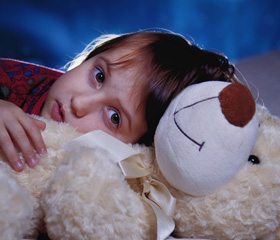by Kate Murray •

Many children in kinship care have experienced complex trauma. The National Child Traumatic Stress Network (NCTSN) defines complex trauma as children’s exposure to multiple traumatic events (such as physical and sexual abuse) from a young age. These traumatic events often occur within their caregiving relationship and have long-term effects on a child’s behavior and development. When children are focused on survival, they often miss out on important developmental experiences, such as learning skills they will need to succeed in school, learning to regulate their emotions and behaviors, and forming safe relationships with adults.
Unique Challenges
Parenting a child with complex trauma can be challenging for anyone, but there are some unique aspects of being a kinship caregiver that can be stressors or strengths in a child’s recovery.
Complex trauma occurs when children are exposed to multiple traumatic events (such as physical and sexual abuse) from a young age.
One unique challenge is that unlike many other resource parents, kinship caregivers may not have been planning to be full-time caregivers for their children and they may have experience grief and loss related to their unexpected role change. For example, they may have planned to enjoy their role as a grandparent, aunt, or uncle to the child, but instead find themselves dealing with not only the day-to-day demands of parenting, but also with the behavioral and emotional effects of complex trauma.
Another unique challenge is that some kinship caregivers may have complicated feelings about the child’s history. They might feel guilty, thinking things like, “if only I had intervened earlier, things might not have been so bad for this child.”
Relationships with the birth family can also be more complicated for kinship caregivers. On one hand, children in kinship care may be able to maintain more connections to members of their birth family, which can help them develop a strong sense of where they came from, their identity, and culture of origin. On the other hand, kinship caregivers may have to work harder to maintain boundaries and ensure ongoing safety, especially if birth parents have histories of drug abuse or violent behavior.
Finally, the child’s trauma and grief may be shared with kinship caregivers’ own trauma and grief. For example, if a child comes into the care of a grandparent because their parent died, that grandparent is grieving the loss of their child at the same time the child is grieving the loss of their parent.
Similarly, when there are patterns of intergenerational trauma, some kinship providers may have experienced trauma very similar to what children have experienced, such as sexual abuse or witnessing domestic violence. Again, this is complicated: on one hand, this experience puts them in a unique position to understand and empathize with a child’s experience. On the other hand, it can also be a stressor on their relationship with the child if the wounds from their own trauma have not yet healed.
Mental Health Services Can Be Key
Finding mental health services that address the effects of complex trauma can help kinship caregivers navigate these complexities. Evidence-based trauma treatments, such as Trauma-Focused Cognitive Behavioral Therapy (TF-CBT), are increasingly available across the state. For help finding a therapist for their child, kin caregivers can visit the NC Child Treatment Program at www.ncchildtreatmentprogram.org. For more on how to ensure children receive effective mental health treatment, please read this article by my colleague Donna Potter: https://bit.ly/2Txjiy0.
However, evidence-based trauma treatments on their own may not be enough to help caregivers deal with the multiple ways complex trauma impact’s a child’s mental health. For example, additional treatment may be needed for the effects complex trauma is having on the child’s self-image or ability to establish a trusting relationship with their caregiver. Treatments for the unique impact of complex trauma, such as the Attachment, Regulation, and Competency (ARC) model, can be very helpful, although providers trained in these models can be hard to find. (For more on ARC, visit https://arcframework.org.)
Some kinship caregivers may benefit from mental health treatment for themselves to resolve their own trauma and loss or grieve the changes of the unexpected parenthood. For adults who have experienced trauma and are suffering from symptoms of post-traumatic stress, providers who offer models such as Cognitive Processing Therapy (CPT) may be helpful. Although there is no registry for providers trained in the unique issues of being a kinship caregiver, caregivers can ask questions of potential therapists to see their experience, such as those in this document from Child Welfare Information Gateway: https://bit.ly/2KU6GNC. If they hear unhelpful perspectives, such as, “Why don’t you just give them back?” kinship caregivers should consider seeing a different provider.
Other Supports Also Help
Kinship caregivers may also benefit from support groups where they can connect with others with similar experiences. They may also need training, especially if they have not had the same training opportunities provided to foster parents. Specifically, they may benefit from educational workshops about how trauma impacts children, such as NCTSN’s course Caring for Children Who Have Experienced Trauma. To find a provider of this course near you, go to the NC Child Treatment Program’s provider roster and select “Resource Parent Curriculum” as the treatment model (https://www.ncchildtreatmentprogram.org/program-roster/).
Also, since complex trauma can interfere with a child’s healthy development, kinship caregivers may need support in identifying resources such as occupational therapy, financial assistance, and support in managing multiple weekly appointments with different providers. If they need support in one or more of these areas, kinship caregivers for a child involved with the child welfare system should start by asking the child’s social worker. For resources available to kin caring for children who are not involved with child welfare, see Providing Kinship Care Outside the Child Welfare System? You Are Not Alone.
Conclusion
When children are hurt through relationships, as is the case with complex trauma, relationships have the power to heal. Helping children heal from complex trauma, however, can be a daunting job. With access to the right supports, kinship caregivers are in a unique position to provide healing for children within their family network. Finding resources is not always easy, but with help from dedicated professionals who understand complex trauma, the journey of parenting as a kinship caregiver can be much more manageable and rewarding.
Kate Murray, PhD, is a licensed psychologist and director of the Center for Child and Family Health’s Post Adoption Support Services.


